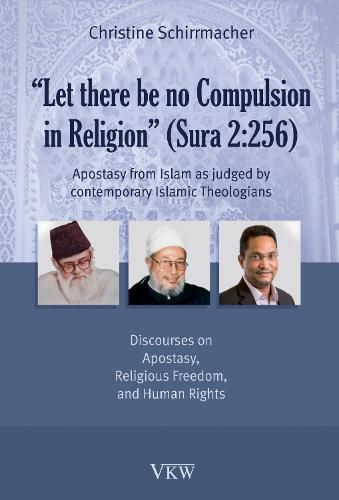Readings Newsletter
Become a Readings Member to make your shopping experience even easier.
Sign in or sign up for free!
You’re not far away from qualifying for FREE standard shipping within Australia
You’ve qualified for FREE standard shipping within Australia
The cart is loading…






This title is printed to order. This book may have been self-published. If so, we cannot guarantee the quality of the content. In the main most books will have gone through the editing process however some may not. We therefore suggest that you be aware of this before ordering this book. If in doubt check either the author or publisher’s details as we are unable to accept any returns unless they are faulty. Please contact us if you have any questions.
In Christine Schirrmacher’s postdoctoral thesis, for the first time one finds reviews of original voices coming from Islamic theology on the topic of religious freedom and apostasy. Arabic, English, French, and Urdu texts have been translated and analyzed and thus made accessible. There are basically three positions which are defended on falling away from the Islamic faith: Complete advocacy of religious freedom, the complete denial of religious freedom with a call for the immediate application of the death penalty for apostates, and the centrist position. The centrist position, however, which allows inner freedom of thought and warns against premature persecution, calls for the death penalty in the case of open apostasy (e.g., in the case of conversion to another faith). Within established Islamic theology, the latter approach is nowadays the most frequent point of view found. These three main positions on apostasy are introduced in this postdoctoral thesis by means of the publications of three influential 20th century theologians: Yusuf al-Qaradawi (b. 1926), Abdullah Saeed (b. 1960), and Abu l-A'la Maududi (1903-1979). They all have followings of many millions of people and have political influence at their disposal. The study explains why in many Muslim majority countries there is still today only very limited or sometimes no freedom of religion (in the sense of the Universal Declaration of Human Rights adopted by the United Nations in 1948) for converts, critical intellectuals, artists and progressive Quranic studies specialists, journalists and secularists, agnostics and confessing atheists, enlightened thinkers, women’s rights and human rights activists as well as adherents of non-recognized minorities.
$9.00 standard shipping within Australia
FREE standard shipping within Australia for orders over $100.00
Express & International shipping calculated at checkout
This title is printed to order. This book may have been self-published. If so, we cannot guarantee the quality of the content. In the main most books will have gone through the editing process however some may not. We therefore suggest that you be aware of this before ordering this book. If in doubt check either the author or publisher’s details as we are unable to accept any returns unless they are faulty. Please contact us if you have any questions.
In Christine Schirrmacher’s postdoctoral thesis, for the first time one finds reviews of original voices coming from Islamic theology on the topic of religious freedom and apostasy. Arabic, English, French, and Urdu texts have been translated and analyzed and thus made accessible. There are basically three positions which are defended on falling away from the Islamic faith: Complete advocacy of religious freedom, the complete denial of religious freedom with a call for the immediate application of the death penalty for apostates, and the centrist position. The centrist position, however, which allows inner freedom of thought and warns against premature persecution, calls for the death penalty in the case of open apostasy (e.g., in the case of conversion to another faith). Within established Islamic theology, the latter approach is nowadays the most frequent point of view found. These three main positions on apostasy are introduced in this postdoctoral thesis by means of the publications of three influential 20th century theologians: Yusuf al-Qaradawi (b. 1926), Abdullah Saeed (b. 1960), and Abu l-A'la Maududi (1903-1979). They all have followings of many millions of people and have political influence at their disposal. The study explains why in many Muslim majority countries there is still today only very limited or sometimes no freedom of religion (in the sense of the Universal Declaration of Human Rights adopted by the United Nations in 1948) for converts, critical intellectuals, artists and progressive Quranic studies specialists, journalists and secularists, agnostics and confessing atheists, enlightened thinkers, women’s rights and human rights activists as well as adherents of non-recognized minorities.